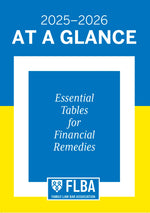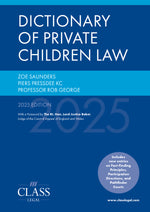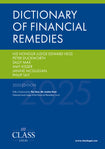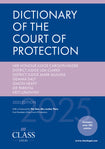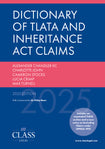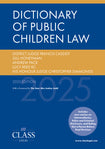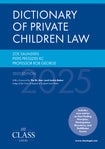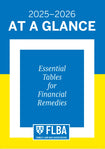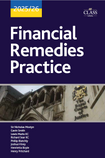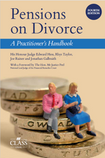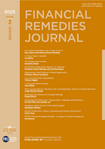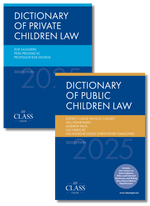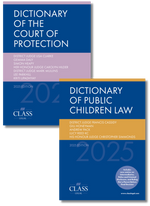Dictionary of Public Children Law 2025
Authors: DJ Francis Cassidy, Gill Honeyman, Lucy Reed KC, Andrew Pack, & HHJ Christopher Simmonds
Shop and save with bundles
Product Overview
Product Description
The Dictionary of Public Children Law is a new addition to what is now a well-established series of Dictionaries published by Class Legal
The Dictionary has a distinctive A–Z dictionary format, giving the reader a portable, potted summary of the most commonly confronted topics and issues in public children law, and providing ready access to the relevant case-law, statutory sources and points of practice.
The overarching aim was to create a quick, user-friendly reference guide, to be consulted as and when the need arises, whether at court or otherwise.
The Dictionary of Public Children Law is the sister publication of the Dictionary of Private Children Law, launched in 2021, the Dictionary of Financial Remedies, launched in 2013, and the Dictionary of TLATA and Inheritance Act Claims, launched in 2023.
New entries for 2025 include:
-
Intermediaries
- Police and Crime Disclosure
- Ruling out a Parent before a final decision
Delivery and shipping information
Delivery is free on orders over £100. Orders can be despatched same day when placed before 1PM Monday to Friday. Orders are not processed or shipped during weekends or holidays.
Delivery fees are not charged on print pre-orders or annual subscriptions of the Financial Remedies Journal as post & packing is included in the item price.
If you have ordered an e-book, you will shortly receive an email with a link to access your book on our bespoke e-reader. There is also a link to access your book on your order confirmation.
If you have any queries, please do not hesitate to contact info@classlegal.com or call our office on 01652 652 222.
Who is this product most suited for?
Author Biography & Information
Product Details
-
Publisher
Class Legal
-
ISBN/Ean
Print ISBN: | 978-1-80161-160-2
Digital ISBN: | 978-1-80161-161-9
-
Edition
2nd Edition 2025
-
Available Formats
Print, Digital
-
E-Book Compatibility
Class Legal E-reader
-
Published
2025-04-01
-
Country of Origin
United Kingdom
-
Book Language
English
-
Pages
128
-
Dimensions
30 x 21 x 0.5
Dictionary of Public Children Law 2025
Authors: DJ Francis Cassidy, Gill Honeyman, Lucy Reed KC, Andrew Pack, & HHJ Christopher Simmonds
